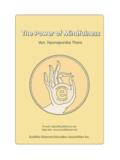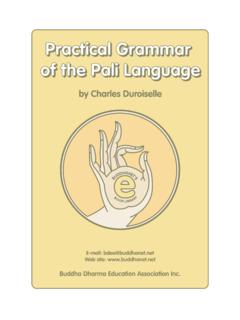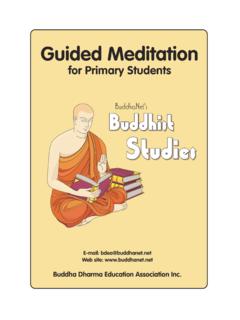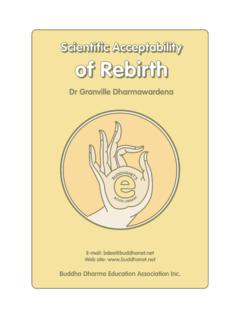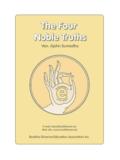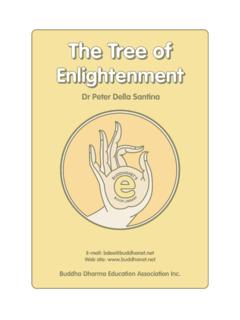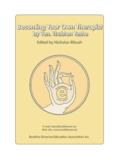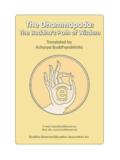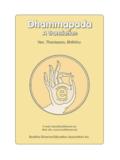Transcription of The Diamond Sutra - Buddhism
1 EBUDDHANET'SBOOKLIBRARYE-mail: site: Dharma Education Association General Explanation of the Vajra Praj a Paramita Sutraby Dhyana Master Hs an Hua- - - - This translation has been prepared by the Buddhist Text Translation Societyof the Sino-American Buddhist Association, under the auspices ofGold Mountain Dhy na Monastery, 1731 15th Street, San Francisco,CA, 94103, by the Sino-American Buddhist Association, Incorporated,1731 15th Street, San Francisco, CA, 94103, USAF irst Printing, September, in the United States of rights portion of this work may be reprinted only with the prior consent of the.
2 XiHow the Translation was made ..xv Preface:The Title .. 27 The Translator .. 39 Chapter 1 The Reasons for the Dharma Assembly .. 46 Chapter 2 Subh ti s Request .. 66 Chapter 3 The Orthodox Doctrine of the Great Vehicle .. 77 Chapter 4 Wonderful Conduct without Dwelling .. 91 Chapter 5 The Thus Principle of Genuine Seeing .. 95 Chapter 6 Proper Belief is Rare .. 97viiChapter 7 Nothing Attained, Nothing Spoken .. 102 Chapter 8 Relying on Dharma They Come Forth .. 106 Chapter 9 The One Mark is No Mark .. 112 Chapter 10 The Adornment of Pure Lands.
3 123 Chapter 11 The Supremacy of Unconditioned Blessings .. 128 Chapter 12 Revering the Orthodox Teaching .. 135 Chapter 13 Receiving & Holding Thus Dharma .. 14 4 Chapter 14 Still Extinction Apart from Marks .. 156 Chapter 15 The Merit & Virtue of Holding the S tra .. 179viiiChapter 16 Karmic Obstructions can be Purified .. 187 Chapter 17 Ultimately there is No Self .. 194 Chapter 18 One Substance Regarded as Identical .. 204 Chapter 19 The Dharma Realm Penetrated & Transformed .. 211 Chapter 20 Apart from Form & Apart from Marks .. 212 Chapter 21 Spoken Yet Not Spoken.
4 214 Chapter 22 There is No Dharma which can be Obtained .. 219 Chapter 23 The Pure Heart Practices Good .. 221 Chapter 24 Blessings and Wisdom Beyond Compare .. 223ixChapter 25 Transformations without what is Transformed .. 225 Chapter 26 The Dharma Body has No Marks .. 228 Chapter 27 Not Cut Off & Not Extinguished .. 231 Chapter 28No Reception & No Greed .. 233 Chapter 29 The Stillness of the Awesome Manner .. 235 Chapter 30 The Totality of Principle & Marks .. 239 Chapter 31 Neither Knowing Nor Seeing is Produced .. 244 Chapter 32 The Response & Transformation Bodies are Unreal.
5 252 The Buddhist Text Translation SocietyLists of Committee Members .. 261xiIntroductionsOn The English Translation of A General Explanation Of The Vajra Praj P ramit S traThis S tra says, One should produce a heart without dwelling anywhere. The Sixth Patriarch, the Great Master Hui, heard that sentence and awakened to the Way. Any dwelling of the heart is no dwelling. Therefore the Larger Chapters say, If one dwells in dharmas, he does not dwell in praj p ramit . If one does not dwell in dharmas, he dwells in praj p ramit . That is why every one of the Great Praj assemblies begins with an explanation of not dwelling.
6 That S tra also says, At that time the World Honored One, using Dharmas which were not witticisms, discussed the marks of the Tath gata. For the sake of all Bodhi-sattvas he proclaimed praj , the profound principle and tendency of the Dharma door of the word wheel saying, All dharmas are devoid of marks because they are apart from the many marks. All dharmas are wishless, because they are without seeking. All dharmas are still, because they are eternally quiescent. All dharmas are impermanent, because they are without a permanent nature.
7 All dharmas are without bliss, because there is nothing which can be blissful. All dharmas are without self, because they have no self-mastery. All dharmas are devoid of purity, because they are apart from the mark of purity. All dharmas cannot xiibe obtained, because in searching for their mark, it cannot be found. That explains the principle and tendency of the emptiness of the S tra also says, At that time the World Honored One, further using the storehouse of those who dwell in and maintain the Dharma, discussed the marks of the Tath gata.
8 For the sake of all Bodhisattvas he proclaimed praj , the total pervasiveness of sentient beings who dwell in and main-tain the Dharma, the profound principle and tendency of the supreme storehouse Dharma door, saying, All sentient beings are the storehouse of the Tath gata, because Samantabhadra Bodhisattva s own substance is all-pervasive. All living beings are the storehouse of vajra, because they are anointed by the vajra-storehouse. All living beings are the storehouse of proper Dharma, because they rely on proper speech to bring about change.
9 All living beings are the storehouse of won-derful karma, because in matters of karma they rely on the additional practices. The previous passage explained that existent dharmas are non-existent. This passage explains that non-existent dharmas are not non- existent. Non-existence and not non-existence is the principle and tendency of the Middle the past, five hundred bhik us became doubtful and disbelieved when they heard the emptiness dharma of praj . Arising from their seats, they departed. The Bodhi-sattva Net Brightness instructed the Brahm God Beneficial Consideration to devise an expedient means to instruct Brahm God replied, Even if they were allowed to depart for as many kalpas as there are grains of sand in the Ganges River, they could not get out of this Dharma door.
10 They are like a fool who, fearing emptiness, tries to walk away from emptiness. No matter where he goes, he does not leave emptiness behind. Those bhik us are just like that. Although they may go a long way, they cannot leave the mark of emptiness. They are also like a man who seeks emptiness. Racing east and west he says, I want emptiness! I want emptiness! That man merely says the name of emptiness; he does not perceive emptiness. Those bhik us are also like that. Desiring to attain nirv a, they practice in the midst of nirv a and do not attain it.
